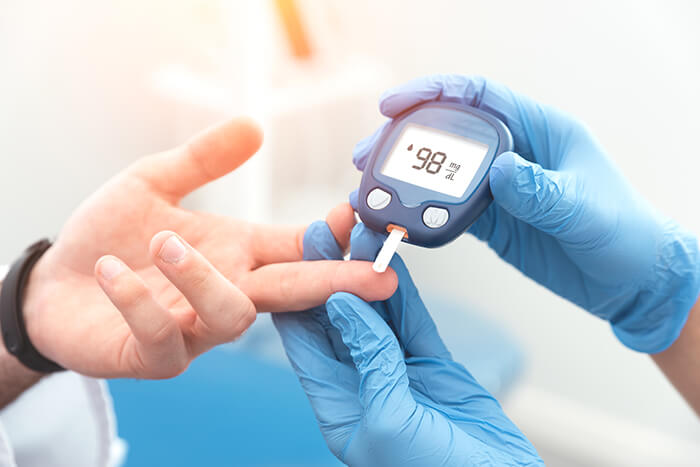
Diabetes is a group of chronic diseases that occur when your body does not produce sufficient insulin or cannot use the insulin it produces. This leads to excessively high sugar levels in the patient’s body. About 1 in 10 people have diabetes in their lifetime, and 1 in 5 people do not know they have the condition. Diabetes patients are at an increased risk for health complications, such as heart disease, stroke, kidney failure, etc., due to the excessive sugar in their blood. However, earlier diagnosis and proper care can help manage your diabetes effectively and prevent future health problems.
What Are the Different Types of Diabetes?
The three main types of diabetes are:
-
Type 1 Diabetes
This is considered to be an autoimmune condition. This means that in type 1 diabetes, your immune system mistakenly but permanently destroys insulin-producing beta cells in your pancreas. Genetic and environmental factors may trigger this diabetes type.
-
Type 2 Diabetes
This occurs when your body cannot use insulin efficiently. This insulin resistance triggers your pancreas to produce more insulin to meet the demand. However, your blood sugar level increases if insulin production is not sufficient.
Type 2 diabetes can be caused by obesity, genetics, physical inactivity, and other environmental and health factors.
-
Gestational Diabetes
Gestational diabetes occurs only during pregnancy by the insulin-blocking hormones produced during that time. However, it can increase your risk for type 2 diabetes. Therefore, you will regularly need to be tested for your blood sugar levels.
What Are the Risk Factors of Diabetes?
Risk factors for diabetes are:
- Smoking
- High blood pressure
- Inactive, sedentary lifestyle
- High cholesterol
- Drinking soda regularly
- Obesity
- Polycystic ovary syndrome (PCOS)
- Family history of diabetes
- High glucose level
- Gestational Diabetes
- If your newborn weighs above 9 pounds
- Steroid use
- Heart or blood vessel disease
- Acanthosis nigricans (a skin condition characterized by dark, velvety patches on the back of your neck, arms, belly, etc.)
If one or more of these risk factors applies to you, especially if you are obese, are aged above 45, or have a family history of diabetes, then watch out for the following diabetes indicators::
- Slow-healing wounds
- Excessive hunger and thirst
- Blurry vision
- Numb or tingling and numbness in your limbs
- Frequent urination
- Drowsiness or fatigue
- Dry, itchy skin
- Unexplained weight loss
- Recurrent gum, skin, and vaginal infections
If you are facing one or more of these symptoms, you might have diabetes and should get yourself tested as soon as possible.
Diabetes Management in Alexandria, Va

Whether you are newly diagnosed, have had diabetes for years, pregnant with diabetes, or want to learn more about effectively using the insulin pump, we can help. We will also provide you self-management tips and instructions to prevent, delay, or reverse complications.
If you are looking for a “gestational diabetes specialist near me” or the “best diabetes specialist near me,” then we are your ideal choice. We are lead by Dr. Kurwa Nyigu, an Internal Medicine specialist with over 20 years of experience. She is also a board-certified addiction medicine specialist and treats behavioral and primary care patients.
Contact us and schedule an appointment today!
FAQs
A diabetic emergency occurs when the blood sugar level becomes excessively low or high. Either condition can be serious and may need hospitalization.
The best foods to control your blood sugar include:
- Low-carb vegetables like eggplant, tomatoes, mushrooms, Brussels sprouts, onions, and low-carb squashes like zucchini
- Greens like spinach, kale, and chard
- Flavored, low-calorie drinks
- Melon or berries
- Whole-grain and high-fiber foods such as lentils, peas, and dried beans
- Low-fat choices like avocado, fatty fishes, and olive oil
- Protein rich foods such as cottage cheese, lean meats, eggs, Greek yogurt, and peanuts
Diabetes mellitus is a very widespread endocrine and metabolic disease and the 7th leading cause of mortality in the US.











